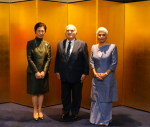You are here
America and China's unhappy anniversary
Feb 22,2022 - Last updated at Feb 22,2022
NEW YORK — The United States and China are this month marking the golden anniversary of their modern relationship. In February 1972, US President Richard Nixon and his national security adviser, Henry Kissinger, stepped off a plane in Beijing, and shortly afterward met with Communist Party of China Chairman Mao Zedong. Their visit triggered a geopolitical earthquake, what Nixon referred to as “the week that changed the world”.
This historic rapprochement swept away two decades of enmity between the People’s Republic of China, known by most Americans then as Red or Communist China, and the US. The antagonism had its roots in the Chinese civil war, in which the US supported the anti-communist nationalist side, which lost and was forced to flee to Formosa (Taiwan) in 1949. The following year, Chinese and American soldiers started fighting and killing one another in the Korean War.
Rising Sino-Soviet tensions in the late 1960s produced a diplomatic opening. Nixon and Kissinger, along with Mao and Zhou Enlai, China’s premier and leading diplomat, regarded the Soviet Union as a shared adversary. China sought protection against a one-time benefactor with which it had fought a deadly border clash in 1969. Nixon and Kissinger, meanwhile, believed an entente with China would give the US leverage against the Soviets and might hasten the end of the Vietnam War. It was a classic case of my enemy’s enemy being my friend.
Even with this convergence of interests, achieving a breakthrough was not easy. The two governments had to agree to manage, rather than resolve, many of their differences. The carefully negotiated document released at the end of Nixon’s trip, the Shanghai Communiqué, noted the differences between the two countries’ political systems and foreign policies.
Regarding Taiwan, the most contentious issue, China stated its position that the Communist government on the mainland was China’s sole legal government and that Taiwan was a province of China. In an example of creative diplomacy at its best, the US acknowledged, but did not endorse, the Chinese position and highlighted its interest in a peaceful settlement of the dispute.
Shared animosity towards the Soviet Union was the glue holding together the Sino-American relationship for the next two decades, until the Cold War ended and the Soviet Union collapsed. China and the US then thought they had found a new rationale for their relationship in burgeoning economic ties. Each side wanted access to the other’s market; the Chinese also wanted access to American capital and know-how. Bilateral tradeincreased dramatically, from roughly $20 billion in 1990 to $120 billion a decade later.
Bilateral trade accelerated further with China’s entry into the World Trade Organisation in 2001, which the US backed in the hope it would encourage the emergence of a more market-oriented, liberal China. For a while, this seemed like a reasonable, if long-term, bet. But, over the past decade, under President Xi Jinping, the government’s role in the Chinese economy grew, subsidies increased, and intellectual-property theft continued. The economic relationship grew increasingly one-sided, with the annual US bilateral trade deficit with China consistently running in the hundreds of billions of dollars.
Likewise, hopes that economic engagement would bring about political liberalisation proved futile. Under Xi, China has become more repressive than at any time since the Mao era. The central government has crushed democracy in Hong Kong, instituted tight controls over the Internet, and forced about 1 million Uyghurs into re-education camps in an effort to erase their religious and cultural identity.
In addition, China has become much more assertive abroad. It has militarised the South China Sea, used force against India, and repeatedly dispatched its military to threaten Taiwan and Japan. As a result, a new cold war between the US and China is widely assumed to be either inevitable or already underway. Some observers even argue that the entire effort to integrate China into a US-led world order was an ill-advised fantasy, a doomed gambit that accelerated the emergence of a great-power rival.
Adding insult to injury is the reality that what began 50 years ago as Sino-American cooperation against the Soviet Union has morphed into Sino-Russian cooperation against the US. In a recent joint statement, Russia lent support to China’s position regarding the origin of COVID-19, as well as on Taiwan. China returned the favour by opposing further NATO enlargement and, in an additional sop to Russian policy towards Ukraine, failed to reiterate its long-held foreign-policy tenet of non-interference in other countries’ internal affairs.
The deteriorating trend in Sino-American relations is dangerous for the world. The growing geopolitical rivalry between the US and China not only could lead to conflict but also risks precluding cooperation on global challenges ranging from climate change and infectious disease to cyber threats and nuclear proliferation.
A half-century ago, the US responded to the Sino-Soviet split with a foreign policy that was creative in design and execution. Nixon’s diplomatic coup helped to ensure that the Cold War remained cold and ended on terms favorable to the West.
The best way to mark the 50th anniversary of the opening to China is not with champagne but by crafting an equally imaginative approach to help revive the relationship. This would again acknowledge the differences between the two countries’ political and social systems, continue to finesse their disagreement on Taiwan, maintain economic ties other than those involving sensitive technologies, and foster cooperation on regional issues such as Afghanistan and North Korea, in addition to tackling global challenges together.
It is no less essential that the US address its domestic divisions, expand its cooperation with European and Asian allies in order to deter Chinese aggression, and join regional trade pacts. Regular, high-level discussions with Chinese leaders are imperative. The goal should not be to transform China, something beyond our ability, but to influence its behaviour. Diplomacy is an instrument of national security that must be used if other instruments, including the military, are not to be overused.
Richard Haass is president of the Council on Foreign Relations. Copyright: Project Syndicate, 2022.












